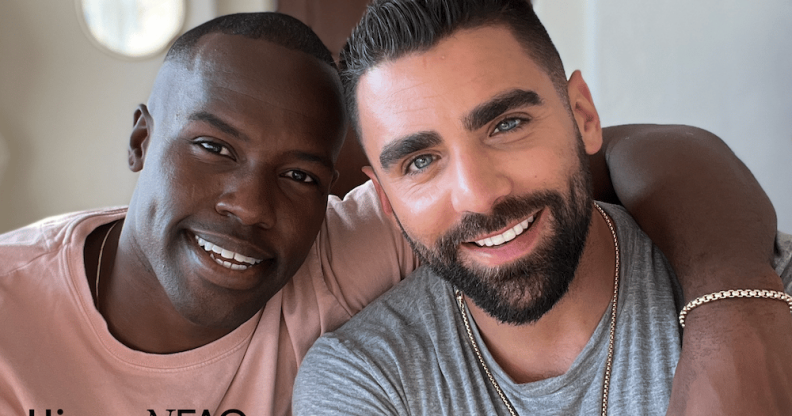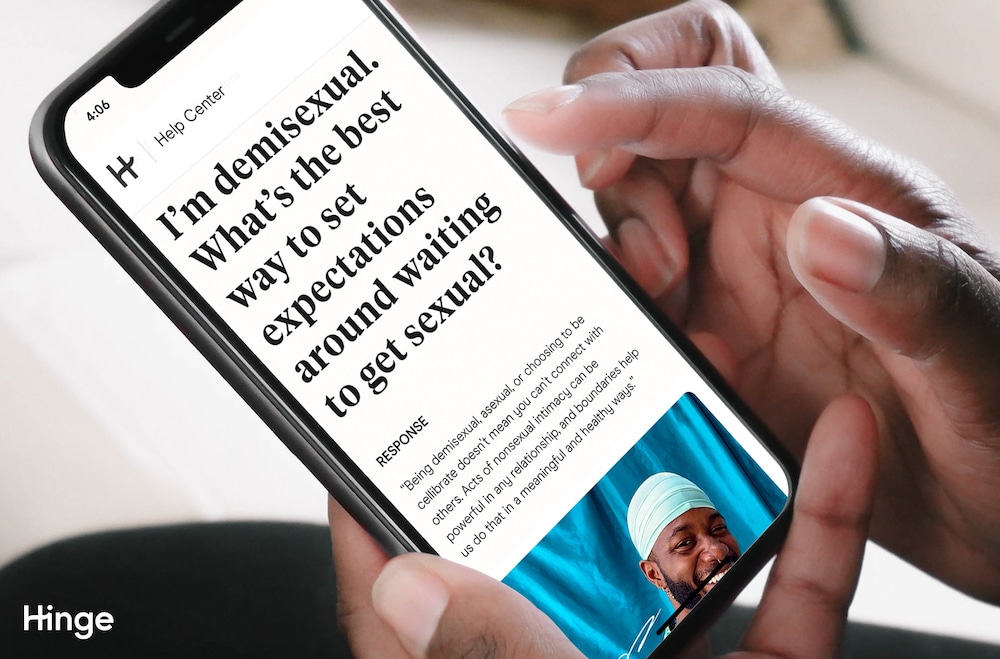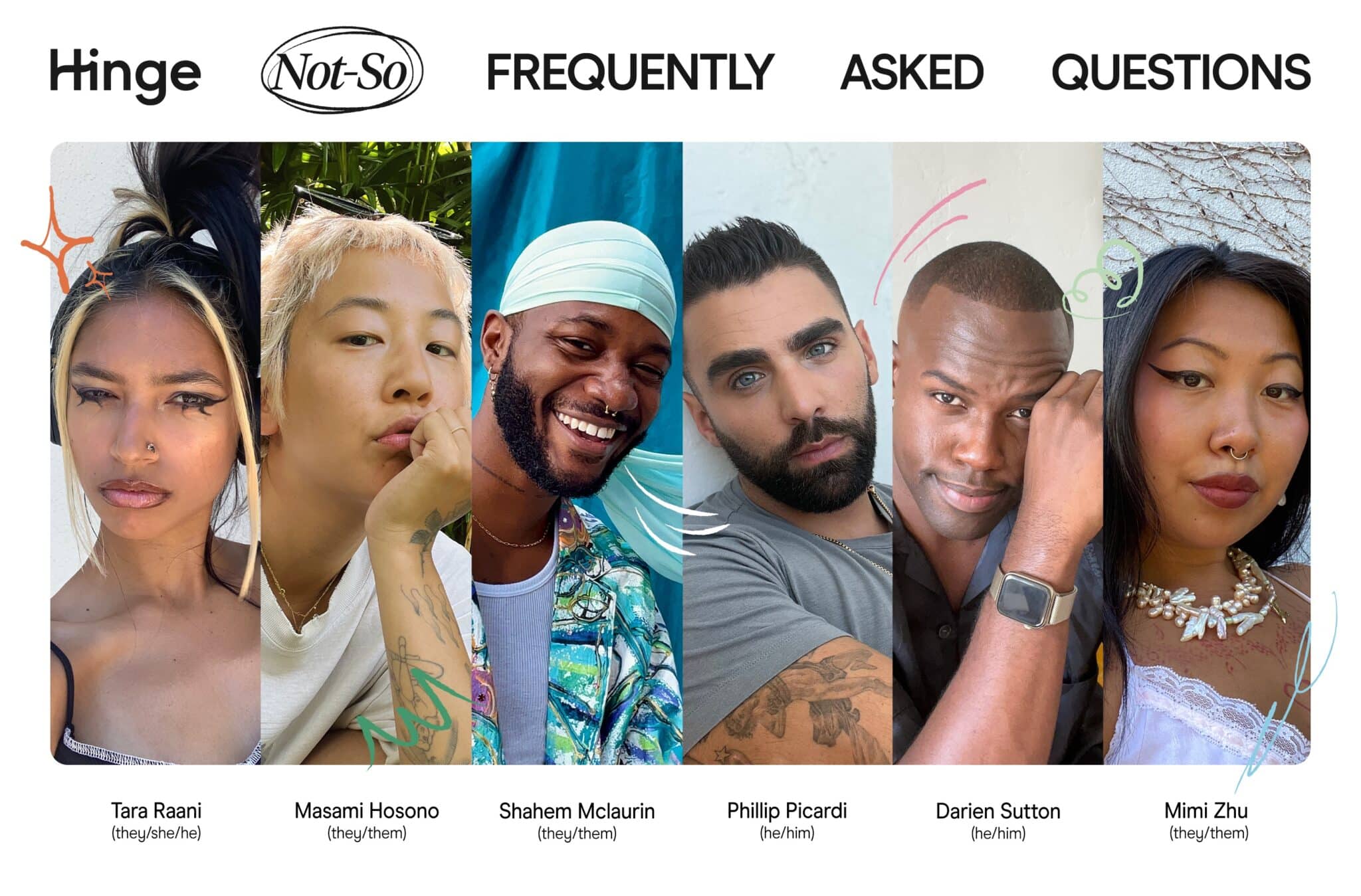Hinge launches new feature to help LGBTQ+ users overcome dating barriers, from religion to drugs

Phillip Picardi and Darien Sutton, who met on Hinge, are two voices helping to answer NFAQs. (Hinge)
Dating app Hinge has launched a new educational feature which is designed to help LGBTQ+ people navigate the trials and tribulations of dating and relationships.
The new feature, NFAQs (Not-So-Frequently-Asked-Questions), will see prominent queer voices tackle topics and answer questions that LGBTQ+ daters may find difficult to discuss with potential partners, such as identity and sexual boundaries.
New Hinge research has found that around four in five LGBTQ+ daters struggle to find inclusive information when attempting to date, becoming an additional barrier for queer people looking for partners.
The NFAQs aim to help queer people to foster open, honest conversations with each other.
Founding editor of queer publication Them, Phillip Picardi, and his partner, ABC News medical contributor Dr Darien Sutton, are two of LGTBQ+ voices answering questions and providing insight through the NFAQs. The pair met on Hinge back in 2014.
PinkNews caught up with the couple to discuss the questions they have helped to answer, and how they think the feature will change the way LGBTQ+ folk date.
“For us as queer people, sometimes these apps are not often made in a way that we communicate and find our partners,” Sutton says. “I’m really happy to see things like NFAQ come to life because it helps to create real conversations about real subjects that we are actually curious about.”

One of the NFAQs that Sutton addresses on Hinge is that of substance use, a topic that can often feel contentious within the community. As a physician, he wanted to use his platform to discuss how people can set their own, non-judgemental boundaries around what they are comfortable with when dating.
“I think there’s just so much stigma related to the topic of substance use that people come to decisions before they actually get to know someone,” he says.
In Sutton’s NFAQ response, he recommends people take time to “understand what associations [they] draw with substance use, and where these associations come from”, but concludes that it’s “perfectly acceptable to want to choose a partner that shares your boundaries”.
“I just think it’s important to have a conversation, sit down, practice active listening, and get to know people,” he adds. “You may decide that you don’t want to be in a relationship or intimate partner or close partner with that person, but you may gain a new friend.”
For Picardi, the topic of religion was an important one to cover. One of his NFAQ answers looks at how LGBTQ+ people can discuss their faith if they’re worried about how a prospective partner might respond.
Picardi recently completed a master’s degree in religion at Harvard University and now considers himself a person of faith, but he recognises from personal experience that religion can be a point of tension for LGBTQ+ people.
“If I were to have sat across from Darien eight years ago and Darien would have told me that his faith was very important to him, I probably would have considered that a red flag,” Picardi says. “I probably would have been like, I don’t know if I want to get involved with a religious partner.”
Hinge’s new study found that 81 per cent of LGBTQ+ daters are uncertain about whether they would date someone with different religious beliefs.
In his NFAQ answer, Picardi recommends that when initiating conversations around faith, daters should be understanding of each others’ experiences, and instead use the opportunity to focus on the similar values you may have – even if your thoughts on religion differ.
“I was thrilled to answer the question as someone who previously would have potentially even looked down upon someone who called themselves queer and religious,” Picardi adds. “It felt revelatory for me. I hope that my answer at least helps people, both who are of faith and who are not of faith, understand that there are bridges that we can build, no matter what your personal belief systems are.”
Other topics that are covered within the NFAQ section include how to start dating when you’re not out and how to feel affirmed in your gender identity while dating.
Over coming months, Hinge will continue working with a number of queer voices to answer more pressing questions to help the LGBTQ+ community navigate dating.

NFAQs is the latest addition to Hinge’s commitment to LGBTQ+ inclusion. In May, the app launched a new fund to increase access to therapy for LGBTQ+ daters, while back in March, the app rolled out new conversation prompts specifically for queer users, with the aim of making it easier for the community to connect with one another.
LGBTQ+ profiles on Hinge have been on the rise since 2019, when the United States secretary of transportation Pete Buttigieg revealed that he met his husband via the app.
For Sutton, the NFAQ function will hopefully enable more queer people to use the app to have healthy, open conversations.
“Oftentimes, when you’re looking at examples of what love looks like or trying to get advice from people, you often get these very cookie cutter responses that may not be realistic,” Sutton says.
“The cool thing about the NFAQs are they’re real questions that you would ask someone that you know personally. You don’t often get to see the responses on a platform like this. I think that that is helpful, interesting, and necessary to have those conversations.”
“I see a lot of hope and change in how these apps are navigating to be more inclusive. I’m hopeful that this is just the start.”

